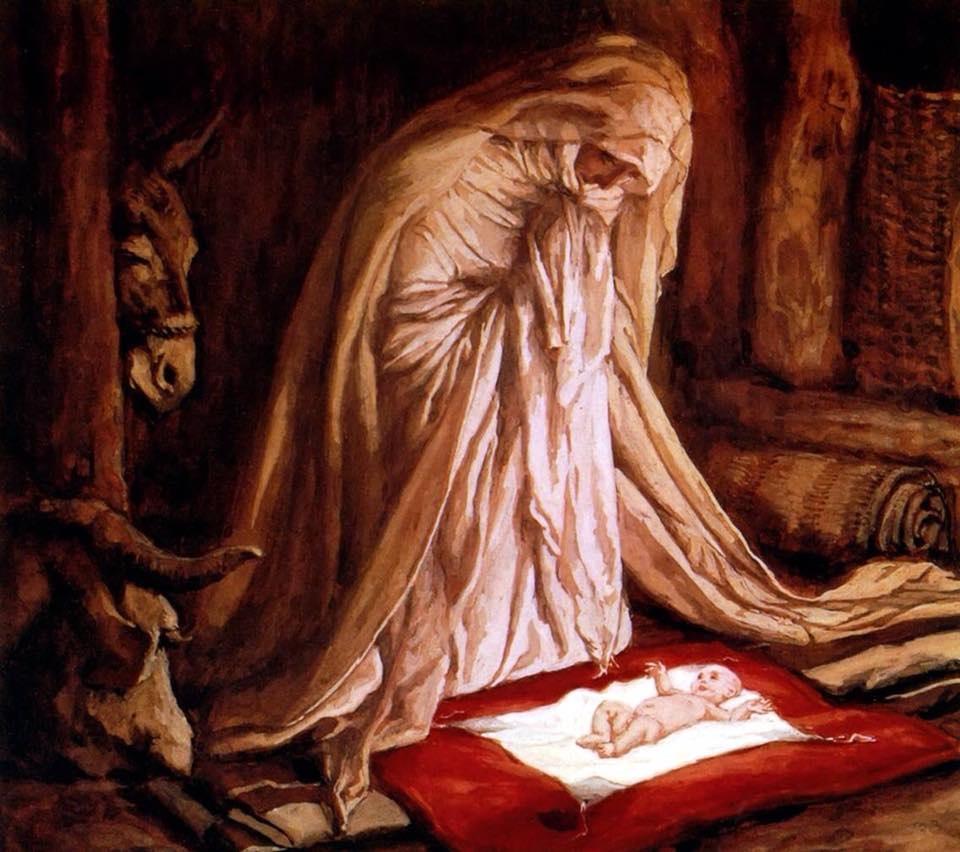(Richard Crashaw, Quem Vidistis Pastores)
Adventus Domini: The coming of the Lord—it is the great theme of the Scriptures. A theme that began with God’s stroll on the fresh and unspoilt garden ground, (suspended suddenly by the anxious cry to humanity lost, “Where are you?”), taken up again, presaged through patriarch, prophet, and poet until the final testimony and prayer of the Apocalypse, “Behold, I am coming soon.’ Amen. Come Lord Jesus!” The coming of the Lord—He who is present everywhere, found in all things and yet hidden in unapproachable light—He has come and is coming.
But adventus is not merely a biblical theme; it lies at the core of humanity’s great, foundational stories. The dangerous journey home, the longing for arrival even to the point that one would go through hell to get there, is that not the archetypical story of Gilgamesh or Homer’s Odyssey? For similar reason’s Martin Luther was taken with Virgil and could call the Scriptures a “divine Aeneid.” For it, too, recounts a wandering from the ruins of the past (horesco referens!), a pressing on through storm, labors, sorrows, even death!—to the hope of a bright country and a new city.
Yet what we have been hearing in our hymns this Advent and Christmas season is not just any advent but the advent of descent—the coming down of the Son of God, down into our dark and desperate condition, or as Luther said, “into the muck and work that makes his skin smoke.” It is this coming down in order to bring up again—this is the journey, the odyssey of the Gospel. C. S. Lewis describes it thus:
“One has a picture of a strong man trying to lift a very big, complicated burden. He stoops down and gets himself right under it so that he himself disappears; and then he straightens his back and moves off with the whole thing swaying on his shoulders.

Or else one has the picture of a diver, stripping off garment after garment, making himself naked, then flashing for a moment in the air, and then down through the green, and warm, and sunlit water into the pitch-black, cold, freezing water, down into the mud and slime, then up again, his lungs almost bursting, back again to the green and warm and sunlit water, and then at last out into the sunshine, holding in his hand the dripping thing he went down to get. This thing is human nature; but, associated with it, all Nature, the new universe.
Now, as soon as you have thought of this, this pattern of the huge dive down to the bottom, into the depths of the universe and coming up again into the light, everyone will see at once how that is imitated and echoed by the principles of the natural world; the descent of the seed into the soil, and its rising again in the plants.
There are also all sorts of things in our own spiritual life where a thing has to be killed, and broken, in order that it may then become bright, and strong, and splendid.
… that is why I believe that God really has dived down into the bottom of creation, and has come up bringing the whole redeemed nature on His shoulders.”
But now we have come to that moment of Christmas–the holy nativity and all that this could mean. Throughout the history of the church this moment has inspired various theological reflections. Some have found Christmas as an occasion to focus on the great mystery and significance of the incarnation itself—what it means that the eternal God has become a human being; what it means for us that divinity has joined itself to humanity. Wonderment and awe often proceed from such reflection, marveling, for instance, that Mary, this young woman is truly the mother of God; that she carries her creator in her womb; that she looks down into the eyes of the One to whom she also lifts up her prayer.
Another aspect of the church’s Christmas devotion is the preaching of Jesus’ birth as the beginning of his path to the cross. In this expression of our faith, Christmas signifies the necessary prerequisite for Good Friday—in other words, Jesus was the child born to die. You have probably all seen the Christmas card which depict a manger filled with straw on the front, but when opened turns the strands of straw into a crown of thorns: (die Krippe und das Kreuz), the crib exchanged for a cross. The good news of salvation that Jesus brings to us cannot be understood apart from his death for our sins, and this is true even here at the manger.
But there is yet another aspect of Christmas reflection and proclamation, one that I learned from Martin Luther (e.g. Weihnachtspostille, 1522). It is one that contemplates not only what it means for God to become a human being, but more specifically, what it means for us that God came as a baby. What does it mean that our salvation has come as a little child, that the Christ promised long ago finally appeared, but as a little baby?
Newborns are so very small, aren’t they? Everything is so tiny, so fragile, so perfect. Every little stretch and blink and yawn is just about the sweetest thing one could ever hope to see! Now the fact that God chose to save us by becoming such a sweet, little, helpless baby tells us something about God; it tells us something about how he sees us; it teaches us about the heart of God.

Throughout the Scriptures the coming of God is a fearful event—and rightly so. From theophanies on Sinai, to the glory filled temple, our God is a consuming fire. But the heavenly line that echoes through Christmas is “fear not!” God has come, but we don’t need to be afraid. He has come to us as a baby in order to show us his heart—that he longs to visit us with his grace and mercy. As the in the words of that old Appalachian Christmas carol, he has come as a gentle stranger. Clothed in the weakness of frail human flesh, the baby Jesus reveals to us God’s infinite love for the world—for sinners. It would appear that in a world which contains so much suffering, so much hate, so much wickedness that God would desire to abandon it. But look at the baby. When we witness the wars and misery in this world, injustice, the crying out of the persecuted and lost, we may wonder if God listens, if God cares. Trying to reconcile the tragedy of this world with the all-powerful, all-knowing God is an endeavor that’s beyond our capacity and it often leads to doubt or despair. Instead, attend to how God has revealed himself to us: Look at the baby.
Look at the baby. Look at the sweet little child. Can you be afraid of such a baby? Don’t you rather wish to hold him in your arms, to give him tender kisses, to embrace him? Yes, yes, embrace him! Christmas is God’s invitation to be embraced! He is God’s sermon to us, his eternal Word made flesh. Before he can even speak, this little child proclaims to us the heart of God.
A little Child, Thou art our Guest
That weary ones in Thee may rest;
Forlorn and lowly is Thy birth
That we may rise to heaven from earth.
All this for us Thy love hath done;
By this to Thee our love is won;
For this our joyful songs we raise
And shout our thanks in ceaseless praise!



Leave a Reply
You must be logged in to post a comment.